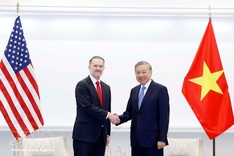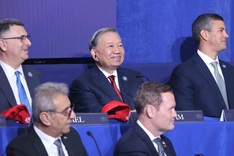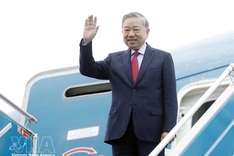With the name Nguyen Ai Quoc and his active patriotism, Nguyen Tat Thanh (later to be known as Ho Chi Minh), began building the first stage of his political reputation.
 | |
| A cartoon by Nguyen Ai Quoc, published in the journal “Paria” |
Nguyen Tat Thanh arrived in Marseille the first time in June 1911. After a brief visit, he went back to the Amiral Latouche-Tréville. The ship went to Le Havre and Dunkirk and returned to Marseille three months later. He wrote a letter to the President of the French Republic, asking for permission to attend the Colonial School (École coloniale) as an intern. This school had been set up in 1889 to train government officials for posting in Indochina. He was hoping this would be a route towards the liberation of his country.
While waiting for an answer, he returned to Sai Gon, expecting to see his father. But all efforts to find the father failed. His brother and sister had joined the armed resistance movement and the sister had been captured twice by colonial troops. Thanh’s father was also in detention in 1912, and upon release he was put under surveillance by the French.
Going back to the ship, Thanh went to Marseille the third time and learned that his application to the Colonial School had been rejected. He returned to the ship and arrived in Le Havre, where he found a gardening job for a ship owner and also started taking lessons to improve his French.
With help from the ship owner, he got a job with the Messageries Maritimes, traveling around the African colonies. During a stopover in Dakar he saw a group of Africans being ordered by the French to dive into the harbor in a storm to secure small boats. Many of them drowned. Thanh later wrote, “The French in France are all good. The French in the colonies are cruel and inhumane; it’s the same everywhere. I had seen similar treatment in Phan Rang. The French burst out laughing with pleasure while our compatriots were drowning. To the colonists, the life of an Asian or African is worth nothing.”
Thanh spent a lot of time at sea and visited Rio de Janeiro, Buenos Aires, New York, and Boston. While in Boston he wrote to Phan Chu Trinh and reported that he was working as a cook’s assistant at the Parker House Hotel.
In 1913 Thanh left Boston and arrived in London. His first job was sweeping snow at a school but he couldn’t cope with long hours in freezing weather. He found another job making charcoal; from early morning to late night he was feeding coal into a boiler. Working in a dark and extremely hot basement, he thought this was worse than the previous job.
He was soon hired as a kitchen assistant at the Carlton Hotel in the Haymarket. His skill and manner impressed the great chef Escoffier and he was transferred from washing dishes to making pastries and cakes. In his spare time, Thanh studied English and got involved with the Overseas Workers’ Association, whose aim was to improve the working conditions in British factories.
In 1917 he left his job at the Carlton Hotel and went back across the channel to France. Thanh’s political activities during his years in London are still largely unknown to the public.
Arriving in Paris, Thanh began attending meetings at the local chapters of the French Socialist Party. He was to help establish a liaison with workers groups between Great Britain and France. His labor union activities soon put him in touch with many left wing politicians and writers. At their weekly meetings, sometimes Thanh was invited to speak about the conditions in Indochina. He stood out as no ordinary man, and was noted for his “dark eyes that flash with intensity when he speaks, and seem to penetrate the soul of the observer.”
The French authorities in Indochina became very interested in Thanh’s activities. In June 1917 the Governor General of Indochina established the spy agency (Sûreté Générale) to monitor all individuals seen as a security risk to the Asian colony and inside France. They recruited three bilingual Vietnamese as spies to follow Thanh’s daily movements.
The winter of 1918, right after the First World War, was extremely harsh. There was a severe shortage of fuel and charcoal throughout France. At night the curfew was still reinforced. Unemployment was widespread. Thanh was now living with Phan Chu Trinh, and helped Trinh in his photo restoration studio.
In early 1919 Thanh learned about the International Peace Conference to be held in Versailles. He prepared a petition to present to the American Secretary of State, hoping for an intervention to free Viet Nam from the colonial regime. It was at this time that he adopted the name Nguyen Ai Quoc - Nguyen the Patriot, as the author of the petition.
By mid 1919, the French had come to label Nguyen Ai Quoc as “the most dangerous rebel” threatening French security in Indochina.




















